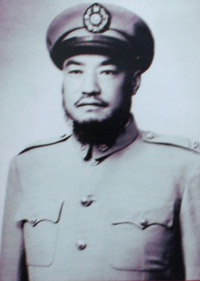Va Bung
| Va Bung | |
|---|---|
 | |
| Sheng Pye of the Great State of Karduv | |
| In office 16 March 1939 – 12 May 1950 | |
| Preceded by | Position Established, preceded by the Military Regency |
| Succeeded by | Position Abolished, succeeded by the Chairman of the USCWS |
| One of the Military governors of the Kingdom of Karduv | |
| In office 19XX – 16 March 1939 | |
| Preceded by | Position Established, preceded by the Mai Emperor |
| Succeeded by | Position Abolished, succeeded by the Sheng Pye of the Great State of Karduv |
| Personal details | |
| Born | Va Bung Dèzì Lì Veng 15 July 1886 Toyur, Karduvic Mai dynasty |
| Died | March 5, 1974 (aged 87) Toyur, USCWS |
| Nationality | Karduvic |
| Spouse(s) | Tyoyeng Erng |
| Children | Va Tyi Va X |
| Father | Va Ta |
Va Bung (Karduvic: va bung Va Bung) was one of the Five Dragons ruling Karduv in the 20th Century, and later dictator of Karduv from 1939 to 1950. He was born in 1886 to a small family in the town of Toyur, and was raised in poor condition. In 1904 the Karduvic Civil War began, and he quickly volunteered to join the Royalist Army in Karduv. Va Bung proved an excellent strategist and a good soldier. With shortages of qualified royalist army staff, he quickly was promoted to being a Colonel in 1908 at only 22. As the civil war came to a close in 1910, Va Bung quickly began to increase his prominence in the new Karduvic state, eventually deposing the Military Regency and becoming the sole Dictator of Karduv in 1939.
Early life and education
Born as Va Bung Dèzì Lì Veng, Va Bung lived a harsh life in rural Karduv under the Mai Dynasty. Born in the small village of Toyur, his family remained poor until his father obtained a higher military position after the X War. Va Bung was the only member of his family to receive any major education, and attended the Royal Academy of Karduv, though he dropped out after enlisting at the beginning of the civil war.
Civil war service
The Karduvic Civil War broke out in 1904, and the then 18 year old Va Bung quickly volunteered to join on the side of the Royalists. Va Bung served in several battles, and quickly distinguished himself as a talented soldier and tactician in the 1905 southern offensive. He was quickly promoted by higher ups, as staff shortages in the royalist army meant that few were qualified to hold higher positions. By 1908 he was an influential commander of the southern front, and was renowned for his destructive and effective campaigns which would tear through enemy supply lines, and lead an decisive offensive against the Republican forces in the summer. Despite his young age, he earned respect amongst the older high command of the military government, and quickly joined their inner circle.
Rise and rule
Post civil war
After the civil war, Va Bung became a respected figure within the nation. His achievements in the civil war and strong anti-corruption stance made him popular with both the military government, and the people of Karduv. During the regency of Mai Time Ming, Va Bung and the rest of the military government worked to fight the corruption endemic to the Mai system of government, and helped establish a stable Karduv after the civil war. His insistence on efficient land reform, and the removal of many old aristocratic systems in Karduv made him popular among the poorer populace, who constituted a majority of the population outside the major urban centers. X
Rise to power
By the 1930s, the rest of the military oligarchs in power began to lose popularity and favor to Va Bung. Va Bung’s substantial reforms and dedication to Karduv rapidly began to paint the rest of the oligarchs as uncaring and incompetent. In the late 1930s, protestors began to demand the removal of the weak and inefficient oligarchs, as well as the now powerless Mai monarch. X With the help of the Royal Parliament and the Karduvic military, Va Bung took power on March 16th of 1939; dissolving the Kingdom of Karduv and establishing the Great State of Karduv. X
